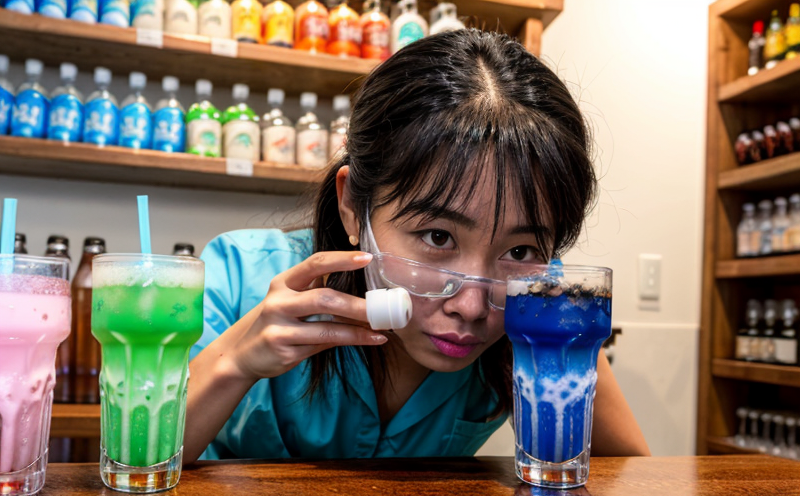EN 16772 Shelf Life and Spoilage Microbial Testing in Drinks
The European Standard EN 16772 provides a comprehensive framework for shelf life testing of fermented beverages, including beer, wine, cider, and other similar products. This service is designed to ensure that manufacturers comply with regulatory requirements and can confidently market their products within the stipulated shelf life without concerns about microbial spoilage.
Shelf life studies are essential in the beverage industry as they determine the duration for which a product remains safe and palatable under specified storage conditions. Microbial spoilage, characterized by off-flavors, off-odors, or visible signs of contamination, can significantly impact consumer satisfaction and brand reputation. By adhering to EN 16772 standards, manufacturers can ensure that their products meet the highest quality expectations.
The testing protocol outlined in EN 16772 involves several key steps: sample collection, preparation, inoculation with target microorganisms, incubation under controlled conditions, and subsequent analysis of microbial growth. This process allows for the identification of spoilage organisms such as lactic acid bacteria (LAB), Brettanomyces species, and other potential contaminants that could compromise product quality.
The standard emphasizes the importance of selecting appropriate test strains to accurately reflect real-world scenarios. For instance, when testing beer, researchers might use Lactobacillus brevis or Brettanomyces bruxellensis, which are known for their ability to cause spoilage in fermenting beverages. Similarly, for cider, strains like Lactobacillus plantarum may be employed.
In addition to identifying specific spoilage organisms, EN 16772 also focuses on assessing the overall microbial stability of the product over time. This involves monitoring changes in microbial counts and metabolic activity throughout the shelf life. By doing so, manufacturers can gain valuable insights into how various environmental factors—such as temperature fluctuations or packaging integrity—affect product quality.
One critical aspect of EN 16772 is its emphasis on replicating realistic storage conditions during testing. Laboratories equipped with specialized incubators and humidity chambers allow for precise control over environmental variables, ensuring that the results accurately reflect how the product will perform in real-world situations. This approach enhances the relevance and reliability of the test data, providing manufacturers with a robust basis for making informed decisions about shelf life.
Another important feature of EN 16772 is its focus on long-term studies. Many beverages undergo significant changes over extended periods, particularly those that are stored at elevated temperatures or exposed to varying humidity levels. By conducting multi-week and even multi-month trials, manufacturers can better understand the long-term impact of these factors on product quality.
In summary, EN 16772 provides a robust framework for shelf life testing in the beverage industry, ensuring that products remain safe and enjoyable throughout their intended shelf life. This service is crucial for maintaining high standards of quality control and compliance with regulatory requirements.
Industry Applications
- Fermented beverages such as beer, wine, cider, and mead
- Liquor products that undergo fermentation processes
- Beverages intended for extended storage periods
- Products requiring precise control over microbial growth to maintain flavor profiles
This service is particularly beneficial for companies looking to optimize their production processes, enhance product safety, and ensure compliance with international standards. By leveraging EN 16772, businesses can gain a competitive edge by delivering consistently high-quality products that meet consumer expectations.
Competitive Advantage and Market Impact
Compliance with EN 16772 not only ensures regulatory compliance but also enhances the reputation of beverage manufacturers. Consumers increasingly demand transparency regarding product quality, especially when it comes to shelf life and safety. By adhering to this standard, companies can build trust with their customers, leading to increased brand loyalty and market share.
Moreover, EN 16772 helps businesses stay ahead of potential challenges in the industry. As global regulations become more stringent, companies that adopt these standards early on are better positioned to navigate future changes. This proactive approach can also attract new partnerships and investments from stakeholders who prioritize sustainability and quality.
The ability to conduct accurate shelf life testing according to EN 16772 gives manufacturers a strategic advantage in the competitive beverage market. It allows them to make data-driven decisions about product formulation, packaging, and storage conditions, ultimately resulting in products that are not only safe but also enjoyable for consumers.
By demonstrating their commitment to quality through rigorous testing protocols like EN 16772, manufacturers can differentiate themselves from competitors who may rely on less stringent methods. This differentiation is particularly important in today's crowded market, where consumers have numerous options and expect consistent excellence from their favorite brands.
Use Cases and Application Examples
In practice, EN 16772 shelf life testing plays a crucial role in several key areas:
- Product Development: Developers use this service to refine formulations, optimize fermentation processes, and enhance flavor profiles.
- Quality Control: Quality assurance teams employ these tests regularly during production runs to ensure consistency across batches.
- New Product Launches: Companies launch new products using EN 16772 data to establish their initial shelf life claims.
- Supply Chain Management: Logistics and storage departments rely on this information to optimize temperature-controlled environments for longer-term storage solutions.
A notable example is a leading brewery that implemented EN 16772 testing as part of its new product launch strategy. After rigorous testing, they were able to extend the shelf life of their flagship beer by three months, resulting in increased sales and reduced waste. Another case study involves a winery that improved its packaging process using EN 16772 insights, leading to fewer spoilage incidents and higher customer satisfaction.
These real-world applications underscore the importance of EN 16772 in ensuring product quality and safety while also enhancing market competitiveness.





